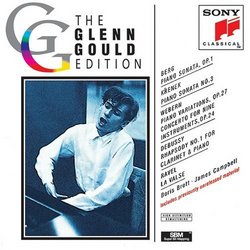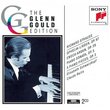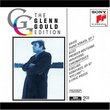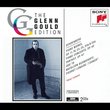| All Artists: Alban Berg, Ernst Krenek, Anton Webern, Claude Debussy, Maurice Ravel, Boris Brott, Glenn Gould Title: Glenn Gould Edition: Berg, Krenek, Webern, Debussy & Ravel Members Wishing: 0 Total Copies: 0 Label: Sony Release Date: 6/27/1995 Genre: Classical Styles: Chamber Music, Forms & Genres, Concertos, Sonatas, Historical Periods, Modern, 20th, & 21st Century, Instruments, Reeds & Winds Number of Discs: 1 SwapaCD Credits: 1 UPC: 074645266121 |
Search - Alban Berg, Ernst Krenek, Anton Webern :: Glenn Gould Edition: Berg, Krenek, Webern, Debussy & Ravel
 | Alban Berg, Ernst Krenek, Anton Webern Glenn Gould Edition: Berg, Krenek, Webern, Debussy & Ravel Genre: Classical
|
Larger Image |
CD DetailsSimilar CDs |
CD ReviewsSING ALONG WITH WEBERN DAVID BRYSON | Glossop Derbyshire England | 08/21/2004 (5 out of 5 stars) "The idea of Gould as a chamber-music performer had always seemed to me as unlikely as the idea of Michelangeli in that role, yet here he is in a Debussy rhapsody with clarinet and in the Webern concerto for 9 instruments. It is a serious mistake to type-cast Gould, I am finding increasingly. As a player of Debussy he won me over right from his first couple of bars, the style somewhat reminiscent of Gieseking, not at all like Michelangeli and far more sympathetic than Ashkenazy. In the Webern he is the absolute model of an ensemble-player too, perfectly in balance with his collaborators. I hope that the names of the composers represented here do not frighten off too many nervous music-lovers. In fact the three biggest names of the second Viennese school, Schoenberg Berg and Webern, are three very distinct musical personalities. Webern is the biggest problem for me, and I believe for many. There are various ways one might approach him. Gould himself heard him as some kind of successor to Mahler, and I think I can just about follow that, at least in the variations. There is a pretty obvious jazz element too, heard here in the last movement of the concerto. This may indeed be cerebral music, more intended for reading than for hearing, as Gould also suggests. I suppose that particular concept makes at least a little more sense than painting intended to be listened to, but in fact Webern works best for me as background music, taken in impressionistically rather than in any kind of intellectual way. One saving grace is that he is at least brief - the variations take not quite 5 minutes and the concerto not quite 6. As a bonus we are given a certain amount of Gould's famous vocal obbligato in a context where a little extra melody does not come amiss. Berg's sonata is another matter entirely, the friendly face of atonalism like most of its composer's work. I had already owned Gould's performance via the Great Pianists of the 20th Century series, and by now it is something of an old friend, with a nostalgic end-of-era feel to it more than any sense of the vanguard of some revolution, and played with real affection and sensitivity. The third sonata by Krenek (1900-1991) is new to me. It does not put me off in the least despite a more vigorous and aggressive idiom than Berg's. It is not, to my ears at least, all that revolutionary or uncompromising, and ought to have something to say to anyone who can even cope with Stravinsky or Prokofiev, hardly avant-garde these days. The last movement in particular, an adagio, is played with real spirituality, the short scherzo is given with bracing clarity and bite, and it hardly needs saying that the entire work benefits from such superlative piano-playing. I would like to have been told more, indeed told anything, about the other performers. The clarinettist is an accomplished virtuoso if somewhat unseductive tone-wise. There is no clue at all either as to who the other 8 performers were in this 1977 broadcast of the Webern concerto. In fact these are all broadcast performances except for the Berg and Krenek sonatas, both of which were studio-recorded in New York over the same two days in 1958. The last item on this disc is Gould's piano transcription of La Valse - it appears he was not too thrilled by Ravel's own attempt at that. This is simply celestial. For the one and only time in my life, I think, I would have mistaken the player for Michelangeli if this had been played to me without attribution. Superlatives fail me - the melody properly masked amid the swirling, whirling accompaniment, the combination of spontaneity with cunning in the rhythm, above all the sublime, sumptuous tone-quality, so rich that - incredibly - I did not miss Ravel's wonderful scoring. The recorded quality is perfectly good without being exactly amazing. Look rather to the piano-playing for amazement here. The total playing-time of the disc is only just over an hour, but at least it includes the total oeuvre of Webern for the instrument. " Who knew? Scriabinmahler | 07/08/2003 (4 out of 5 stars) "Gould's distaste for what I loosely call "smooth" music is not apparent in his transcription of "La Valse." It is an astounding tour de force that after the Berg and Webern pieces, seems like a scoop of ice cream on a simmering day in August. Who knew that Gould could infuse this work with such passion? The Ravel alone is worth five stars. For those somewhat atypical listeners who actually like Berg and Webern, those poets of dissonance, this disc rivals his interpretations of Schoenberg, another discordant chap." Endless revelation J. Richardson | Onancock, VA | 03/14/2007 (5 out of 5 stars) "As an artist who sometimes chooses music while in the studio working I can't find another CD which I enjoy so much. There is such artistry coming from Glenn Gould the music is like being on another plane. Most enjoyable to me are the silences he acheives while holding the entire work together as a totality. The pieces are not typical western music, even the Ravel and Debussy are played like you have never heard them before except small glimpses of melodic line. Great interpretation.Then there is YouTube where you can actually watch him play, what a hoot."
|

 Track Listings (13) - Disc #1
Track Listings (13) - Disc #1

